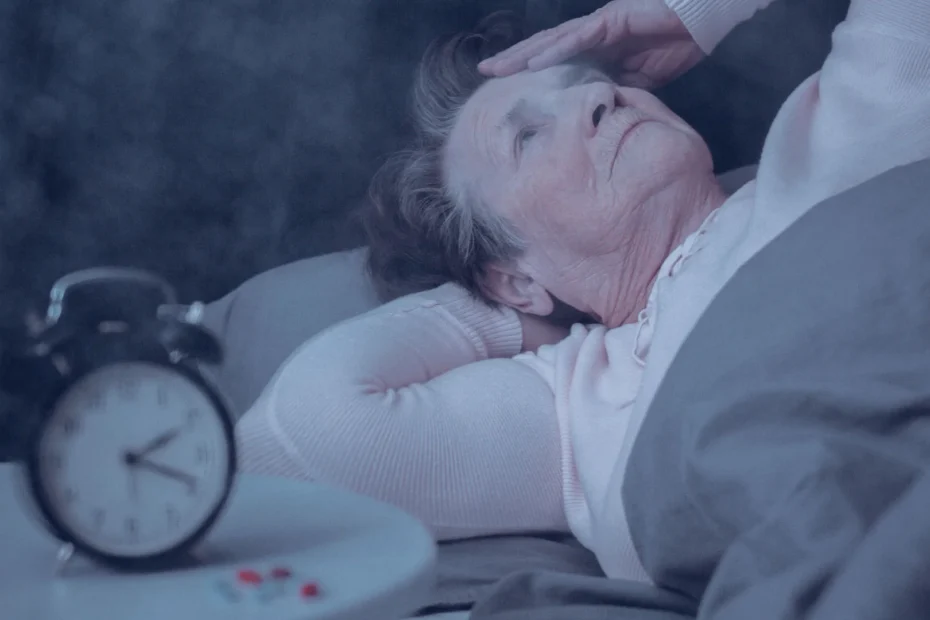30 seconds summary
- Cannabis, particularly its compounds like CBD and THC, can help aging adults manage sleep and wake cycles. THC promotes relaxation, aiding in falling asleep, while CBD may improve sleep quality by reducing anxiety and discomfort.
- Together, they can regulate circadian rhythms, potentially alleviating common sleep issues in older adults, like insomnia or fragmented sleep. Cannabis can also reduce pain or symptoms of conditions like arthritis, enhancing comfort for deeper rest.
- However, it’s important for aging individuals to consult with healthcare providers for personalized, safe use and to monitor potential side effects.
Sleep disturbances are prevalent among aging adults, often exacerbated by chronic pain, anxiety, depression, and the side effects of polypharmacy. As a result, many older individuals are exploring alternative therapies, including cannabis, to enhance sleep quality and regulate circadian rhythms. With the increasing interest in non-traditional solutions, home care services Los Angeles and other regions are seeing a rise in inquiries regarding cannabis use for sleep issues.
This comprehensive analysis delves into the potential benefits and risks of cannabis use for sleep among the elderly, examining its effects on sleep architecture, safety considerations, and the importance of personalized care. For aging adults, it’s crucial that cannabis use is carefully monitored, taking into account existing medical conditions, medications, and individual health needs. Home care providers in Los Angeles are well-positioned to guide families through the complexities of integrating cannabis into sleep management plans, ensuring a holistic approach that prioritizes both safety and quality of life.
Understanding Sleep Challenges in Older Adults
Aging is associated with several physiological changes that can disrupt sleep patterns:
- Altered Sleep Architecture: Older adults often experience a decrease in deep (slow-wave) sleep and REM sleep, which are crucial for restorative rest.
- Increased Sleep Latency: The time taken to fall asleep tends to lengthen with age.
- Frequent Nighttime Awakenings: Many older individuals wake up multiple times during the night, leading to fragmented sleep.
- Daytime Sleepiness: Reduced sleep quality can result in increased daytime fatigue and decreased alertness.
These disturbances are frequently linked to underlying conditions such as chronic pain, anxiety, depression, and the side effects of medications commonly prescribed to older adults.
The Role of Cannabis in Sleep Regulation
Cannabis contains various compounds, notably cannabinoids like tetrahydrocannabinol (THC) and cannabidiol (CBD), which interact with the body’s endocannabinoid system to influence sleep.
- THC: Known for its psychoactive properties, THC has been shown to reduce sleep latency, helping individuals fall asleep more quickly. However, it may also decrease the proportion of REM sleep, which could impact memory consolidation and emotional processing.
- CBD: Non-psychoactive and generally well-tolerated, CBD may have anxiolytic effects, potentially reducing anxiety-related sleep disturbances. Some studies suggest it could also influence sleep-wake cycles by interacting with receptors involved in circadian rhythms.
- Entourage Effect: The combined action of various cannabinoids and terpenes in cannabis may enhance therapeutic effects, a phenomenon known as the “entourage effect.”
Evidence Supporting Cannabis Use for Sleep in Older Adults
Several studies have explored the efficacy of cannabis in improving sleep among aging populations:
- Chronic Pain and Sleep: A study involving older adults with chronic pain found that cannabis use was associated with fewer nighttime awakenings compared to non-users, suggesting a potential benefit in maintaining sleep continuity.
- Insomnia and Sleep Disorders: Research indicates that cannabis may help alleviate insomnia symptoms, particularly in individuals with underlying conditions like anxiety or chronic pain. However, the evidence is mixed, with some studies reporting minimal improvement.
- Systematic Reviews: A review of 39 trials reported that medical cannabis provided an improvement in sleep quality and sleep disturbance for a minority of patients, particularly those with chronic pain conditions.
Risks and Considerations
While cannabis may offer benefits, it’s essential to consider potential risks, especially for older adults:
- Cognitive Impairment: THC can impair short-term memory and cognitive function, which may be more pronounced in older adults.
- Medication Interactions: Cannabis can interact with various medications, including blood thinners and anti-seizure drugs, potentially altering their effectiveness.
- Balance and Coordination: THC may affect motor skills, increasing the risk of falls, a significant concern for the elderly.
- Tolerance and Dependence: Regular use can lead to tolerance, requiring higher doses for the same effect, and may result in withdrawal symptoms upon cessation.
- Sleep Architecture Alterations: Prolonged use may alter sleep stages, particularly reducing REM sleep, which could have long-term implications for cognitive health.
Personalized Approaches to Cannabis Use
Given the variability in individual responses to cannabis, a personalized approach is crucial:
- Start Low, Go Slow: Initiate with low doses, especially for THC, and gradually adjust based on individual response.
- Monitor Effects: Keep track of sleep patterns, mood, and any side effects to assess the efficacy and safety of cannabis use.
- Consult Healthcare Providers: Engage with healthcare professionals knowledgeable about cannabis to ensure safe and informed use, particularly concerning potential drug interactions.
- Consider Non-Pharmacological Interventions: Incorporate behavioral therapies, such as Cognitive Behavioral Therapy for Insomnia (CBT-I), which have shown efficacy in treating sleep disorders without medication.
Conclusion
Cannabis holds promise as a therapeutic option for improving sleep among aging adults, particularly those with chronic pain, anxiety, or insomnia. However, its use should be approached with caution, considering the potential risks and the need for personalized care. Further research is essential to establish standardized dosing, optimal delivery methods, and long-term safety profiles. In the meantime, older adults should consult healthcare providers to explore cannabis as part of a comprehensive sleep management plan, integrating both pharmacological and behavioral strategies for optimal outcomes.
